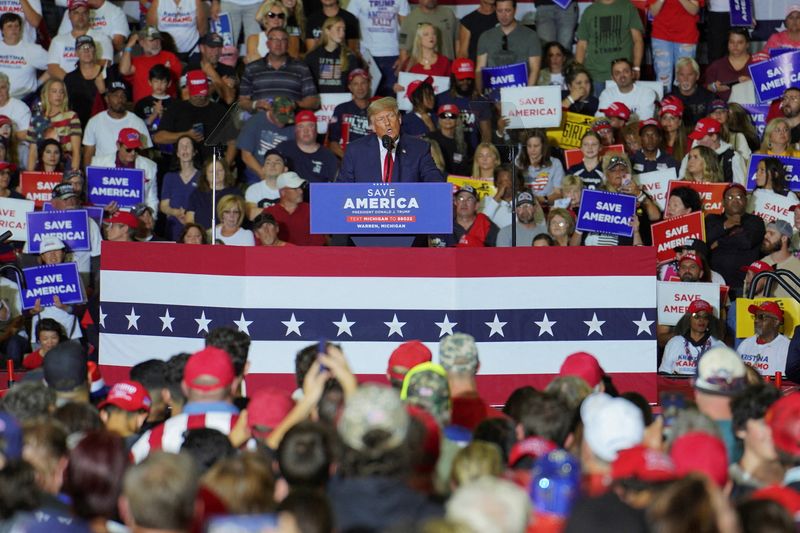[ad_1]

© Reuters. FILE PHOTO: Former U.S. President Donald Trump attends a rally in Warren, Michigan, U.S., October 1, 2022. REUTERS/Chery Dieu-Nalio/File Photo
2/4
By Nathan Layne
(Reuters) – Republicans in Michigan approved a proposal on Saturday to select more than two-thirds of their state delegates for the party’s 2024 presidential nomination via caucus meetings, a change that could help party front-runner Donald Trump.
The plan, which Michigan’s Republican state committee approved during a meeting in Grand Rapids, would mark a departure from the battleground state party’s traditional process of allocating all presidential delegates based on a primary open to the public.
The change would be significant because 70% of delegates would be decided at caucus meetings, where the party’s most active members will likely exert the most sway. That could serve as an advantage for Trump given his popularity among local party officials, some Republicans and political experts said.
Under the plan, caucuses on March 2 in Michigan’s 13 congressional districts would be used to appoint three delegates each, accounting for 39 of the state’s 55 delegates to next year’s Republican national convention. The other 16 will be based on the state’s primary on Feb. 27, according to an amended plan reviewed by the state committee on Saturday.
It remains unclear if the plan will be approved by the Republican National Committee (RNC), as is required. A spokeswoman for the committee could not be reached for comment.
Michael Schostak, a former vice chair of the state party, said the selection of delegates by district caucus would give Trump a “big advantage” because only previously elected precinct delegates will be among those chosen to participate.
“These are not like other states’ caucuses which are more open to a broader swath of the Republican electorate,” he said. “Those Republicans supporting someone other than Trump are not well represented among the current precinct delegates and state committee.”
Running a distant second to former President Trump in national opinion polls is Florida Governor Ron DeSantis. Other candidates polling in single digits include former U.N. Ambassador Nikki Haley, former Vice President Mike Pence and U.S. Senator Tim Scott.
Chris LaCivita, a top adviser to Trump’s campaign, said a rule change would play to his strengths. A spokesman for DeSantis did not reply to a request for comment.
“The president enjoys a really solid level of support among the party faithful in Michigan,” LaCivita said. “We are very bullish on the caucus system.”
Michigan Republicans have been weighing changes to its delegate-selection process after the Democratic Party, which controls the state legislature, moved forward its primary to Feb. 27. Holding it that early would have run afoul of RNC rules, prompting Republicans to propose a compromise plan to avoid having most of its delegates nullified.
Kristina Karamo, chairwoman of the Michigan Republican party, said on Saturday that the hybrid primary and caucus plan was aimed at avoiding a penalty from the RNC.
“Republicans in Michigan deserve FULL representation at the RNC convention. We will honor the voice of those who vote in the state-wide presidential primary, and those voting in the caucus,” Karamo wrote on Twitter.
Elaine Kamarck, a senior fellow at the Brookings Institution and author of a book on nominating contests, said the proposed changes by Michigan Republicans were also significant due to timing, with the caucuses set for three days before “Super Tuesday” on March 5, when a large number of states choose their delegates.
“It’s a launch pad to Super Tuesday,” she said. “If Trump is really strong in Michigan he may sail to the nomination.”
[ad_2]
Source link
(This article is generated through the syndicated feed sources, Financetin doesn’t own any part of this article)
